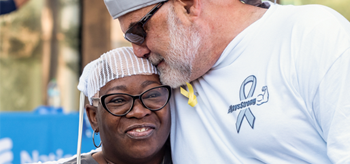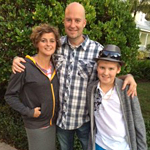Winning The Fight Of Your Life
Greg
Thank you for inviting me to share my story of survival with you here today.
My name is Greg Cantwell. I was born in Dusseldorf, Germany where I lived for the first 12 years of my life. Then we moved to the States where I went to high school in Potomac, Maryland and then off to college in Durango, Colorado.
I moved to Hawaii in 1999 to continue my career with Continental Airlines. It was a dream just to be living in paradise. I was strong and in good mental and physical condition. I lived in Hawaii for five years. Then in September of 2004 I was offered a job with Northwest Airlines that would take me to Minneapolis Minnesota. On October 28, 2004, my plane had just arrived in Minneapolis, where I would begin my new job with Northwest airlines. I checked into my hotel, went out to eat and went to bed for what I thought would be a good night sleep.
At approximately 11:15pm, I awoke, experiencing a grande mal seizure. I couldn’t talk, was barely able to breath, and was conscious but very confused. I was rushed to the emergency room where the doctors asked me all sorts of questions. The questions were “easy” and I knew the answers, but could not come up with them. I was scared. Why could I not answer these easy questions, but everyone else could? I was given a CT scan and next a MRI. Then they said the doctor was calling in a neurologist from home. I thought to myself, “Why?” “This can’t be that serious, or can it?”
The neurologist finally arrived and delivered the news no one wants to hear, “Greg you have a brain tumor.” Two days later I returned for a biopsy of the tumor. A few days after that, the results were in. It was a Stage IV Glioblastoma Multiforme. I could tell in the neurologist’s eyes and tone of voice that the chances I would survive were extremely slim. I thought to myself, “Did I hear him right?” “I have a brain tumor?” “Why me?”
That was the only time I ever felt sorry for myself. From that point on I was positive and knew I was going to beat this cancer no matter what the statistics or doctors said. My son was one year old at the time. I thought to myself, “I have to be here for him.” “I want to see him go to school on his first day, play sports, have his first girlfriend, graduate from high school, get married, etc.” “I have to be here for all that and I am not going to die!” I buckled down for the fight of my life.
I met with my oncologist, who explained I had a 5% chance of surviving one year. He gave me three options for treatment. 1. Have surgery but do nothing to aggressively fight the cancer and enjoy the limited time I had left with minimal medical intervention. 2. Have surgery, do minimal radiation and chemotherapy to hopefully extend my life a year or two. 3. Have surgery and go all out to fight this cancer with everything that medicine had to offer. This option would make me the sickest, require many different treatments but would hopefully give me the best chance of long-term survival.
Given this information, I had a lot to think about. On the positive side, I was strong both mentally and physically and had the will to want to beat this. I decided that I would take option three and was scheduled for surgery two weeks later.
My decision was not made lightly. No one not even the doctors knew if the treatment would work or at least extend my life. Adding foreign objects into the brain after tumor resection raises the risk of infection. After the six weeks of radiation in conjunction with Temodar. I once again chose to deviate from the standard of care. I understood the risks of the Intra Arterial treatment plan – this is where a catheter was inserted into the artery in my groin and threaded up into my brain where Carboplatin was released. The risks involved with this procedure included bleeding, blood clots and even stroke every time this procedure was preformed which ended up being 12 times. In addition to that I was given two rounds of Cytoxin and Etoposide through a port put in my chest. There were so many unknowns but I thought to myself, I am to young to die, there is so much I wanted to do with my life and most importantly I had to be here for my son. I accepted the fact that this “cocktail” of chemotherapies had the potential to make me the sickest but also in my eyes gave me the best chance of long term survival and we signed off on the treatment plan.
Notice I said we. It was very important to me that I played and continue to play an active role and take ownership of any treatment plans or decisions that would be made about me care. This made me stronger, be more positive and increase my strength to fight.
I was scared. I had never had any type of surgery before and now I was having a craniotomy. I had no clue what to expect. What would it feel like falling asleep? Would I have complications during surgery? How would I feel when I wake up? Would I remember anything? All these questions and uncertainties!
The big day finally arrived. Scared and with tears in my eyes, my parents and friends said that they would see me when I got out of surgery and I was wheeled down the hallway. I don’t remember even getting to the operating room. I was told afterwards that the neurosurgeon told my family and friends that he didn’t know what to expect; meaning, would I be able to talk? Feed myself? Walk?
I woke up in ICU and was told that the surgery lasted five hours. The neurosurgeon came in and explained the procedure. He implanted five Gliadel Wafers into the resected tumor site to release direct chemotherapy to the left over cancer cells over a period of two and a half weeks. After a brief recovery from the surgery I went through six weeks of radiation in combination with Temodar. Temodar is offered in IV and oral form. My insurance thank god covered it in the oral form. I believe that the oral form provides the patient with a better quality of life because there is no need to go into an infusion center you can take it in the comforts of your own home and being in own environment promotes healing.
After I completed the radiation therapy, I had a couple weeks to rest up before starting my regular chemotherapy regime. Over the next 12 months I went into the hospital for three consecutive nights each month where I would receive two types of chemotherapy back to back Cytoxin and Etoposide, then a rest period, then the same chemotherapy back to back again. The day before my release from the hospital I went to interventional radiology where I would receive the Intra Arterial Carboplatin.
For the next twelve months family members took turns flying in and staying two weeks at a time to take care of me. After my twelve chemo sessions I was put on a “watch-and-see” status. Textbooks and statistics showed a 100% chance the tumor would grow back. Thank God, to this day, it hasn’t. Currently I have MRI’s every four months and they have been clear.
I sincerely believe that in addition to the treatments for Glioblastoma, which I received, having a positive attitude throughout my entire treatment, being strong, having a proactive doctor who thought outside of the box is why I am still here today.
As I think back over the years prior to my diagnosis I remember having migraines, which started in high school. They would happen 2 to 3 times a year and were extremely severe. I could tell they were coming on because my tongue would go numb. Then starting with my fingertips my arm would start to go numb. My sight would go blurry, I couldn’t stand to be in the light, then I would get start vomiting. I went to the doctor a number of times was never given a CT Scan or MRI. Could this have been the start of the tumor? No one knows not even the doctors can determine how long the tumor had been there.
I got remarried in June of 2009 to a wonderful woman who has had first hand experiences of dealing with a terminal illness, She herself has Cystic Fibrosis, has had a liver transplant and has diabetes. We have a unique bond and take care of each other in addition to taking care of my 10 year old son.
It has been Almost 10 years since diagnosis. I have dedicated my life to helping those going through cancer or caring for someone going through cancer. There is so much that a person like myself can do to help. I have dedicated my life to helping an educating those going through a similar diagnosis. I volunteer at a number of Cancer Organizations throughout the United States. These Organizations and foundations include The National Brain Tumor Society, MD Anderson’s Cancer Survivorship program, Cleveland Clinic Taussig Cancer Center , Children’s Brain Tumor Foundation and Imerman Angels.
Almost 5 years ago I started my first website survivorandcaregiver.com which has received over 150,000 hits from all over the world. In June of 2012 I founded Greg’s Mission a 501(c)3 non profit the website is gregsmission.org
Greg’s Mission: A nonprofit that provides support, HOPE, education, current resources and awareness to patients suffering from brain tumors especially Glioblastoma Multiforme (a grade 4 primary brain tumor) via phone, email, skype and personal visits.
More recently, the past three years in May I have been part of a delegation with the National Brain Tumor Society that went to Washington to lobby my State Representatives and Senators to increase NIH funding and for a federal bill for Chemotherapy Parody. This bill is very important for patients as I mentioned before for quality of life. Currently only about have states have there own bill which makes the insurance companies cover both the oral and IV Temodar the same. Every patient should be able to make the choice for themselves as to which form of Temodar they want to take IV or oral.
So I want to thank all of you for what you do. For working through the frustrating times of having to start over because the outcome wasn’t what you had hoped. I want to challenge you to continue doing what you do, because it does make a difference in millions of peoples lives around the world on a daily basis. You are allowing those special words “I love you” to be heard by our families and giving us the chance to hug our children and spouses one more time. What you do means the world to me and my family so thank you.
I am going to close with this quote, which I came up with which sums it up for a patient.
“Staying positive can be hard at times but you have to focus on what you believe you outcome will be. I am going to beat this cancer. Stay strong, get rest when you need it and call on your friends for support. To admit you need help is not a sign of weakness. You are not a statistic! You should be treated as a patient not as a diagnosis.”



